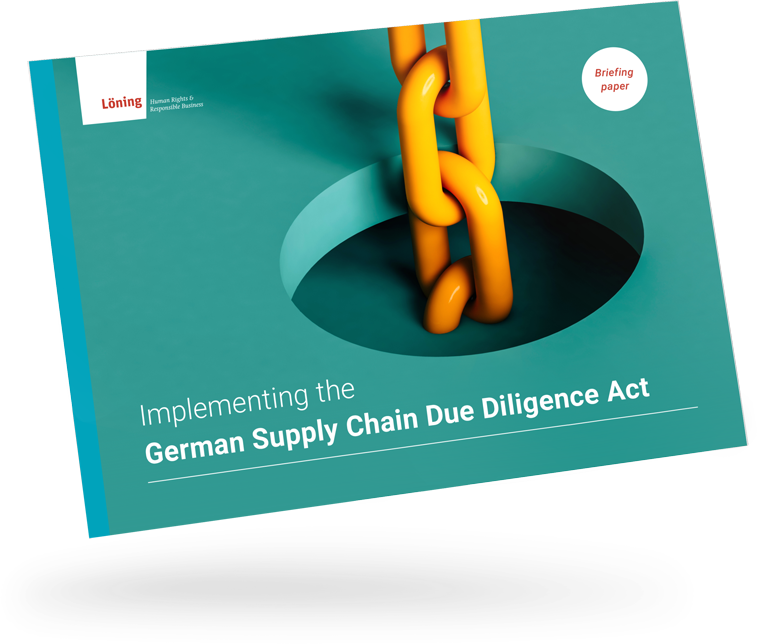Everything you need to know about the
Wondering what the German Supply Chain Due Diligence Act (Lieferkettengesetz) is all about? Find the answers here.
Germany is setting new international standards by requiring companies to live up to their responsibilities when it comes to human rights and the environment. The German Lieferkettengesetz (LkSG) took effect on 1 January 2023. Companies must now identify and address human rights issues and environmental risks in their own operations and their supply chains. In other words, they must use their economic power to prevent such risks around the world – and make their operations and global supply chains more and more sustainable.
Who does the LkSG apply to?
Since 1 January 2023, the legislation applies to companies with over 3,000 employees and as of 1 January 2024, it will also apply to those with over 1,000 employees. However, regardless of size or location, smaller companies, too, would be wise to familiarise themselves with the Supply Chain Due Diligence Act. Because if a company is in any way part of the supply chain of a larger company based in Germany, it will surely be asked to comply with the new law sooner or later.
Download paper
- 1 Embed responsible business conduct into all relevant business processesCreate strategy, policies and management systemsEstablish a governance system with clear roles and responsibilities
- 2 Conduct a risk analysis to identify human rights and environmental risksAssess, weigh and prioritise identified risks
- 3 Implement action to prevent, end or minimise the violation
- 4 Establish complaint procedures (or participate in an external one) to enable persons to report human rights and environmental risks and violationsImplement remedial action to end or minimise violations
- 5 Document and track implementation and results
Regularly review effectiveness and adequacy of measures Communicate findings and efforts
What is the German Supply Chain Due Diligence Act (LkSG)?
The German Supply Chain Due Diligence Act (“Lieferkettensorgfaltspflichtengesetz” in German, or “LkSG” for short) was recently adopted by the German Federal Government. Under the Act, companies are required to create transparency and meet due diligence obligations in their global supply chains and their own operations. It is all about identifying and addressing human rights issues and environmental risks along the supply chain, from raw material sourcing to production and delivery. The Act sets clear rules for the practical implementation of companies’ obligations and levels the playing field for companies in Germany.
Which companies fall within the scope of the LkSG?
The LkSG applies to all businesses whose central administration, principal place of business, administrative headquarters or statutory seat or branch office is located in Germany. Initially, this will apply to businesses with more than 3,000 employees. After 1 January 2024, however, it will also apply to businesses with more than 1,000 employees. This figure includes both temporary and permanent employees of all affiliated companies. The effects of the LkSG are expected to extend to smaller companies, too, as requirements are passed down the supply chain.
What are the legal obligations of the LkSG?
According to the German Supply Chain Due Diligence Act, companies are required to set up a management system to fulfil their due diligence obligations. This management system must ensure that human rights and environmental risks are identified and that any potential violations are prevented, ended or minimised.
Which corporate function is responsible for implementing the LkSG?
Under the Act, companies are required to delegate in-house responsibility for the topic of human rights and the risk management system. Creating a “human rights officer” position is one way of doing this. The highest management level must be included in the adoption and endorsement of the company’s policy statement on respecting human rights and the environment.
How will companies report on supply chain due diligence under the LkSG?
The Act requires due diligence activities to be documented continuously within the company. This includes all responsibilities, processes, and measures – as well as any identified violations. Such documentation must be retained for seven years and serves as evidence for the appropriateness and effectiveness of the company’s due diligence. In addition, the company must submit and publish on its website an annual report on the fulfilment of its due diligence obligations. This report must cover, for example, the human rights and environmental risks which were identified, and the effectiveness of the measures taken. As the responsible supervisory authority, the German Federal Office for Economic Affairs and Export Control (BAFA) issued reporting guidelines detailing how to integrate the documented information into the comprehensive annual report. The guidelines on reporting can be found here.
What sanctions do companies risk if they fail to implement the LkSG?
If companies fail to fulfil their due diligence obligations appropriately, the German Federal Office for Economic Affairs and Export Control (BAFA) can issue the following sanctions depending on the violation:
- Fines of up to €800,000
- Fines of up to 2% of the company’s average annual global turnover for companies whose average annual turnover exceeds €400 million (e.g. for failing to take remedial action or failing to take action in a timely manner)
- If a fine of over €175,000 is imposed, exclusion from public contracts for a up to three years
How can we support you?
Löning – Human Rights & Responsible Business is an international management consultancy specialised in human rights. With our multinational and interdisciplinary team of experts, we help companies establish and integrate effective human rights due diligence processes.
We provide top-level strategic
guidance at each step of
implementing the LkSG
- Assess your risk exposure and management maturity
- Develop a roadmap to address your specific needs
- Build governance management system and select the right tools
- Train your people and build capacity to manage human rights risks
- Structure and draft your human rights reporting


















